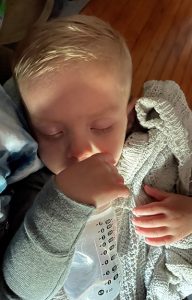Masks are down, colds are up

Now that the masks are down we’re finally sharing those smiles we all missed, but unfortunately, those germs are also seizing the opportunity they’ve missed for the past few years. Germs (mostly in the form of viruses thanks to effective vaccinations) – are currently wreaking havoc on our little ones.
Hennepin Healthcare pediatric infectious disease specialist Stacene Maroushek, MD emphasizes the importance of vaccinating children to avoid some of the common childhood illnesses, including influenza, that can add to the surplus of infections that are widespread right now.
 “Don’t wait – vaccinate,” she says. “Prevention is always the best medicine. And teach your child how to avoid spreading germs when they are feeling crummy. Make it age-appropriate and fun.”
“Don’t wait – vaccinate,” she says. “Prevention is always the best medicine. And teach your child how to avoid spreading germs when they are feeling crummy. Make it age-appropriate and fun.”
Germs are spread when a cough or sneeze occurs within 6 feet of another person, and when a person touches secretions, then puts that hand on a hard surface like a doorknob, light switch, or cell phone without washing their hands or sanitizing first. Then of course the next person who touches that surface is the recipient of those germs. Hand sanitizer and cleaning solutions kill most viruses.
“Viruses can’t be cured with antibiotics, and right now there’s even a shortage of some antibiotics that are complicating the ability to care for kids with ear infections, which can occur with colds, too,” explains Dr. Maroushek. “For treating viruses, there’s a limited supply of an anti-viral called Tamiflu for patients that qualify like the very young, very old, or those with certain underlying medical conditions.”
Ashley Strobel, MD is an emergency physician at Hennepin Healthcare who sees children as well as adults in the emergency department.
“Fever is a symptom like a cough,” she explains. “Just like all coughs aren’t life-threatening, fever from a virus is not life-threatening. Ibuprofen and Acetaminophen can lower the fever for up to 6 hours and keep your child comfortable enough to drink fluids to prevent dehydration. Follow dosing instructions as this may likely need to be given every 6 hours, for example at breakfast, lunch, dinner, and bedtime.”
Honey can be given to babies and toddlers who are over the age of 12 months and is proven to decrease nighttime cough; however, cough and cold medicines are not recommended by the American Academy of Pediatrics (AAP) for children less than 6 years of age.
“Symptoms often seem worse at night so a few sleepless nights for parents and caregivers are expected when caring for little ones with RSV or these other viral illnesses that are making the rounds,” says Dr. Strobel. “Take care of yourself as well because you’ll likely catch the virus from them. As Dr. Maroushek mentioned, teaching toddlers to cough or sneeze into their elbow may save you some runny noses, coughs, and aches, too.”
If your child has fewer wet diapers and is not drinking fluids due to vomiting or lack of desire to eat or drink, this can be a sign of dehydration. An important tip for viruses with a runny nose is to clear the runny nose in kids less than a year old with a nose suction device before feedings and bedtime. Offer fluids in smaller amounts more frequently than usual to prevent dehydration, and if needed, give your child Pedialyte as a brief milk or formula substitute to restore electrolytes.
Dr. Maroushek reminds parents that it’s always ok to contact their clinic or pediatrician for guidance if they are concerned about their child’s symptoms. A conversation with their doctor or advanced practice provider – who knows their child – is the best option for your child’s health.
Call your healthcare provider and consider a clinic appointment if your child:
- Continues to have a cough, and congestion for more than 10-14 days.
- Is wheezing or having pain with coughing but is not having trouble breathing.
- Has prolonged fever of more than 3-4 days and higher than 100.4°
- Is vomiting and unable to keep fluids down for a day. Is having trouble feeding or less wet diapers.
- Will not take any oral fluids for more than 12 hours or is having less than 3 wet diapers in 24 hours.
- Is fussy, unable to sleep well, tugs at ears, or has ear drainage.
Dr. Strobel reminds parents that for most children, RSV is not a medical emergency and a trip to the emergency room is not necessary unless he or she has severe symptoms that are not able to be managed at home. With some Ibuprofen or Tylenol and nose suctioning, children can make it through the night to see their doctor or advanced practice provider.
Bring your child to the Emergency Department if he or she is unresponsive or has:
- Trouble breathing (ribs sucking in with breathing, flaring nostrils when breathing, pauses breathing, audible wheezing, or is unable to feed normally due to breathing problems).
- Fever of higher than 100.4°F for more than 5 days in a row.
- Listlessness or lethargy (is not alert or responding to you normally) especially after being given a fever-reducing medication.
- An underlying medical condition like asthma or heart disease and your specialist wants them seen.
- A recommendation from your pediatrician to be seen in the emergency department.
- A change in skin color: is pale, blue or gray especially around the lips, hands and feet.
The American Academy of Pediatrics (AAP) has more information about care for common pediatric conditions at www.healthychildren.org

